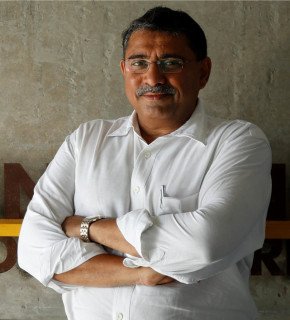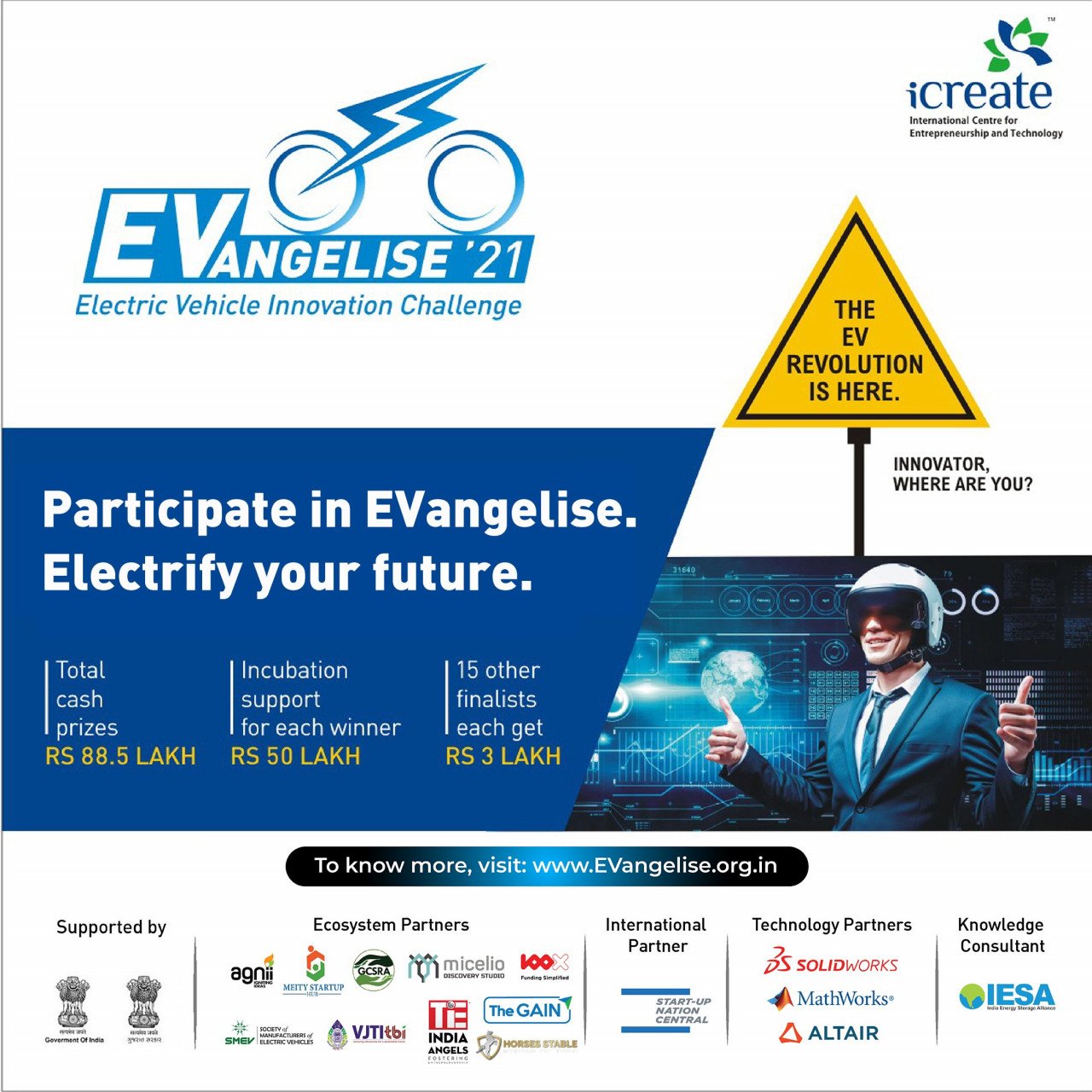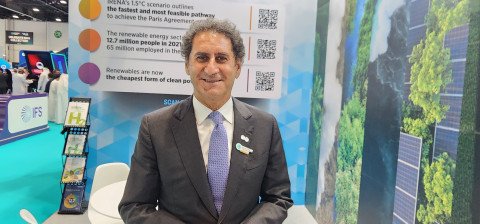EVangelise '21: Harnessing the power of innovation to advance EV Industry
Through its recently launched electric vehicle innovation challenge, iCreate aims to bring together innovators, institutions, and government bodies on one platform. Anupam Jalote, CEO, iCreate discusses how the grand challenge aims to identify the next-gen of innovators in the EV sub-components segment with Moulin Oza, Assistant Editor-ETN.
Please tell our readers about iCreate (International Centre for Technology and Entrepreneurship)?
iCreate is an autonomous super-specialty institute dedicated to converting technology innovations into successful enterprises. The facility was formed under the leadership of our honorable Prime Minister with a vision of promoting the growth of entrepreneurial capital through innovations and technology. We are sector-agnostic but lean towards IoT, embedded systems, Machine Learning (ML)/Artificial Intelligence (AI) based products or applications, that solve the developmental needs of India. Embedded systems and IoT are a focus area for iCreate, in domains like Electric Vehicles, Agritech, Smart Cities, Healthtech, Industrial Automation, Renewable Energy, among others.
What kind of support does iCreate provide for facilitating new-age entrepreneurial pursuits of youth? Please elaborate.
At iCreate, we have a unique model of incubating innovators through different levels of counseling, grooming, training, mentoring, intellectual support, workshops, and annual events covering schools, colleges, entrepreneurs, MSMEs, and Government. The facility is spread across 40 acres of campus on the outskirts of Ahmedabad. Currently, the centre has the capacity to house 100 incubatees concurrently working on 40-50 projects and has so far incubated over 399 startups across sectors like IT, Agro & Food Processing, Electronics, Robotics, Electric Vehicles, Energy, to name a few. Over the years, we have evaluated over 2800 ideas, supported 300+ innovations, applied for 30+ patents, and generated approximately Rs. 45 crore of revenues as well as 600 +jobs through our start-up network.
Please tell us about EVangelise'21 - the EV Innovation Challenge. What are key aspects of the competition and its benefits to the participants?
EVangelise is a first-of-its-kind innovation challenge aimed at identifying and nurturing some of the brightest minds in the country to use the power of innovation in addressing key problem statements of the EV industry. We have planned this in three stages which will run over a period of seven months. EVangelise is targeted at startups, college students, research institutions, independent innovators, and EV enthusiasts, with revolutionary innovations in sub-components used in 2W & 3W electric vehicles. It has been designed to cover the four sub-component levels of an electric vehicle - Electric Powertrain (motor + controller), Battery, BMS, and Hybrid Energy Storage Systems, Regenerative Braking Systems, and Intelligent Vehicle Management Systems. The participants will be able to simultaneously submit their proposals across three different stages- Idea stage, Design stage, Build stage. The grand finale will feature a one-of-its-kind EV race at the Statue of Unity. The top three winners will get cash prizes of Rs 10 lakh, Rs 7.5 lakh, and Rs 5 lakh respectively, besides assured incubation support of Rs 50 lakh each, access to iCreate's facilities, market connects, and industry mentorship. A total of Rs. 88.5 lakh will be given as assured cash prizes to winners across the four categories and three stages.
Why do you think Evangelist 21 will create a difference in the existing ecosystem?
The idea of creating a grand challenge unique to the EV segment in India stemmed from the estimated increase in EV adoption in the commercial market. The reason why we launched EVangelise is that we want to be an integral part of the country's transition to EVs by developing sophisticated, energy-efficient, and sustainable transportation solutions for the Indian market. The intent is to bring all the key stakeholders in the EV ecosystem - innovators, ecosystem players, government, and academia together to bring about a huge disruption in the current way the market is functioning, and we believe that the impact generated from this initiative will be the catalyst to transform India into a world leader in 2W / 3W EVs over a 3-5 year time span.
This is the biggest event in the EV ecosystem bringing together all stakeholders under one umbrella with the common mission to help India transform into a world leader in the EV space. To sustain the engagement of innovators in the EV industry and expand the network, we plan to conduct EVangelise annually. This is to ensure that industry starters are handheld and mentored to continuously innovate in the rapidly evolving EV segment and navigate challenges through well-designed solutions in the changing industry landscape.
What kind of industry tie-ups has iCreate secured for EVangelise'21?
For Evangelise, we have partnered with bodies across sectors. To name a few, we have collaborated with AGNII, MEITY Startup hub, Gujarat Corporate Social Responsibility Authority, TiE India Angel. We have onboarded Solidworks and MATLAB as our technology partners and Start-Up Nation Central as our International partner.
What are iCreate's thoughts of the present Indian EV sector? Please tell us about your key work in the same.
We are already the global leaders when it comes to the two and three-wheeler market but to become the global leader in e-2W/3Ws, we need to address many challenges, from range anxiety to performance and efficiency. For instance, while the whole country is working towards the transition to EVs, we also need to focus on innovating solutions for affordable renewable energy and charging stations for charging these EVs. This is an example of one of the many such challenges we need to identify and thus solve to smoothly transition our way towards sustainable mobility. Therefore, it becomes imperative to shift our focus from making incremental changes or updates to existing products, to creating market disruptive products powered by deep-tech innovation. And we believe that this innovation must happen at the sub-component level so that it can provide a long-term competitive advantage to Indian manufacturers in the global market.
What kind of innovation-based startups has been incubated to date by iCreate?
We have worked with start-ups across sectors and have supported over 300+ innovations and 30 patents. We at iCreate are especially focused on fostering an ecosystem that can thrive on sustainable innovation. Embedded systems and IoT are a focus area for iCreate, in domains Like Electric Vehicles, Agritech, Smart Cities, Healthtech, Industrial Automation, Renewable Energy, among others. iCreate is also home to Cisco's largest Innovation Lab in India and has partnerships with leading institutions in the US, Israel, and other countries. Most recently, we have onboarded six Israeli start-ups as part of the India-Israel Innovation Accelerator, to curate global innovations for Indian markets, including waste-water management and mobility among others.
Currently, we are focusing on the EV segment to drive sustainable mobility solutions for India. We currently host more than five start-ups that operate in the EV sector including, e-cycles and EV charging equipment. Aurita bikes, Fasmho energy, ChargeZone, etc are examples. Apart from the incubated start-ups, the team at iCreate themselves are working on EV projects that can function as a base infrastructure for future start-ups in the EV segment to develop on. These projects include non-lithium batteries for EVs, energy-efficient braking systems among others. iCreate is also home to IoT-based hydroponic farming start-ups, City Greens, and other green innovations.
Your thoughts on the iCreate innovation plans, the future of e-mobility, and the need for sustainable innovation?
The electric vehicle industry in India is picking pace with 100 percent FDI, new manufacturing units, and increased efforts to improve charging infrastructure. A major leap towards EV adoption would be increasing the indigenous manufacturing capabilities of local manufacturers in India. This would also bring down the price disparity between EVs and ICE vehicles. Overall, we envision that by 2030, India will have a significant adoption of EVs, both in private and public transport systems, a robust charging infrastructure sprawled across cities and highways, a reliable energy source to support those, and the manufacturing of the complete electric vehicle taking place domestically with locally produced subcomponents. India has picked up in the space of sustainable innovations with the growth of disruptive entrepreneurs. With such innovations, India has also been attracting investments from companies big or small. With more and more companies focusing their efforts on investing in sustainable alternatives, India has been showing profound transformation with regards to supporting and adapting sustainable infrastructure.




















